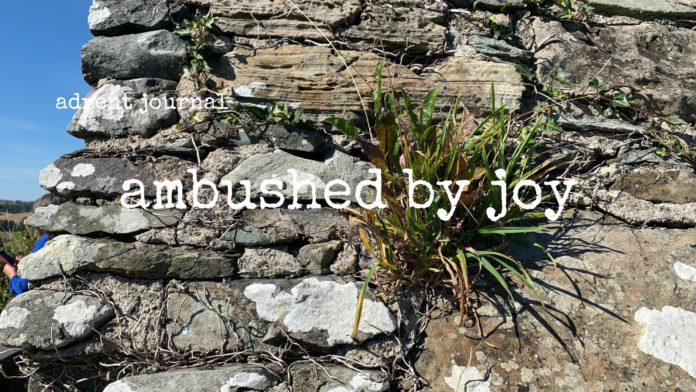One of the highlights of our time in Durham was the monthly gathering at Fullsteam Brewery for “Beer and Hymns.” Jesse DeConto and his bandmates led us in singalongs, both sacred and secular. One of those Sunday nights was the first time I ever heard “Canticle of the Turning.”
my soul cries out with a joyful shout
that the God of my heart is great
and my spirit sings of the Wondrous things
that you bring to the ones who wait
you fixed your sight on your servant’s plight
and my weakness you did not spurn
so from east to west shall my name be blest
could the world be about to turn?
my heart shall sing of the day you bring
let the fires of your justice burn
wipe away all tears for the dawn draws near
and the world is about to turn!
The tune–“Star of County Down”–I knew because my friend Terry Allebaugh (the best harmonica player I’ve ever heard) taught it to me and we played it as a duet a number for times, but the lyrics moved me and have stayed with me. I want to trust that the world is about to turn.
This morning I learned that the lyric is an adaptation of Mary’s response to the news that she would have a child who would be Love Incarnate. Luke’s gospel said she spoke the words to her cousin Elizabeth as she shared news of her pregnancy. No one else was there. The centuries between her and us have taken her words and named them (“The Magnificat”), set them to all kinds of music, and venerated Mary in a way that makes it difficult for us to remember it was a pregnant Palestinian teenager who spoke them. She wasn’t reading a prepared speech or polished lyric. She had no idea that her words would live on as a theological anthem. She was talking to her cousin about something she was still working to comprehend that was also something that gave her hope that the world would not always be like it is.
She was speaking the language of joy.
When I look at our lives, Mary and I don’t have much in common other than our shared humanity, which includes our share of being surprised by both grief and joy. Thanks to Christian Wiman’s collection, Joy: 100 Poems, I learned of one by Lucille Clifton that gave me a better sense of Mary.
hag riding
why
is what i ask myself
maybe it is the afrikan in me
still trying to get home
after all these years
but when i wake to the heat of morning
galloping down the highway of my life
something hopeful rises in me
rises and runs me out into the road
and i lob my fierce thigh high
over the rump of the day and honey
i ride i ride
The last three lines are as good of a definition of joy as I can muster: throw your thigh over the rump of the day and ride like the world is about to turn. We have the image of Mary riding the donkey to Bethlehem. Maybe she rode one to visit her cousin as well. By the time the days were accomplished, as the KJV says, Mary seems more subdued. This time around, she treasured what she saw and heard and held it all in her heart.
Another who didn’t share much in common with Mary was twelfth century mystic Meister Eckhart, and yet he wrote something I come back to most every Advent, and something Ginger quoted in her sermon this morning.
We are all meant to be mothers of God. What good is it to me if this eternal birth of the Divine Son takes place unceasingly, but does not take place within myself? And what good is it to me if Mary is full of grace, but I am not also full of grace? What good is it to me for the Creator to give birth to his Son if I do not also give birth to him in my time and culture? This, then, is the fullness of time: when the Son of God is begotten in us.
I read and quote his words as though I understand their implications, much as I do with Mary’s joyful outburst to Elizabeth, yet they both remain full of mystery and challenge. Joy is not as much a decision as an ambush, perhaps, other than I can choose to take those paths that make me vulnerable to being ambushed. Mary wasn’t expecting an angel or a baby or the life that unfolded from then on, for that matter. When it all came down, she threw her leg over and went for the ride.
Perhaps that last sentence assumes too much and makes the same mistake as others in turning Mary into more than she was in that moment of surprise. Maybe not, since she shared an explosion of joy with Elizabeth and a rush of reality with Joseph and she kept going. We don’t get many details other than her joy–her sense that she was a co-conspirator in ambushing the world with joy.
May it happen to us as it did to her.
Peace,
Milton
Thanks for reading. For the month of December, my book, The e-book version of The Color of Together is 99 cents at Amazon. Please check it out. Also, You can also subscribe to my free weekly newsletter, mixing metaphors. It comes out every Tuesday. Both my newsletter and blog are free and ad-free. If you would like to support my writing, you can become a sustaining member.
